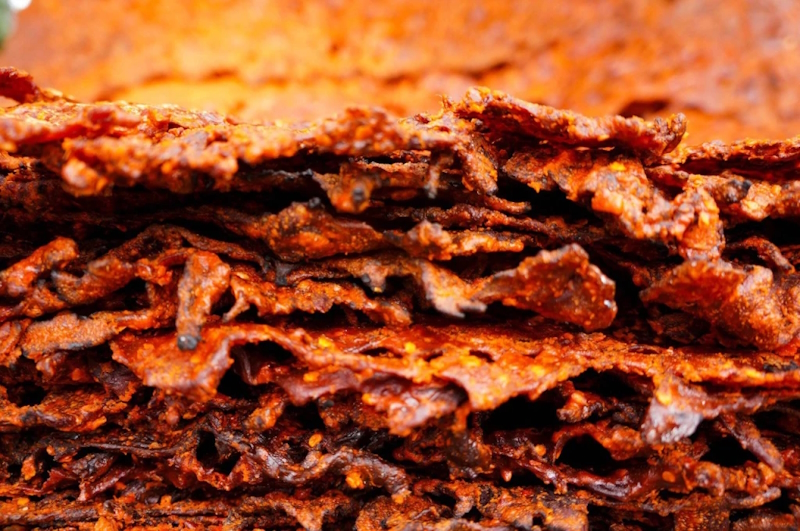Experience the Rich Flavors of Kilishi with Wigmore Trading: A Nigerian Delicacy
Kilishi is a popular Nigerian delicacy, often described as the African version of beef jerky. Known for its spicy, smoky flavor and chewy texture, Kilishi is a cherished snack enjoyed across West Africa. It is particularly popular in northern Nigeria, where it is traditionally prepared and sold by local vendors. Let’s explore the origins, preparation, and cultural significance of Kilishi and show you where to find authentic ingredients through Wigmore Trading, the leading distributor of African food in the USA, UK, and Europe.
The Origins of Kilishi
Kilishi has its roots in the northern regions of Nigeria, where it has been made and enjoyed by the Hausa and Fulani people for generations. This dried meat snack is made from thinly sliced beef or goat meat, marinated in a spicy paste, and then sun-dried. Kilishi is similar to beef jerky but with a unique West African twist, thanks to its rich blend of local spices and flavors.
Ingredients and Preparation
Preparing Kilishi requires a careful blend of spices and traditional drying methods to achieve its distinctive taste. Here’s a classic Nigerian recipe to explore:
Ingredients:
- 1 kg beef or goat meat (thinly sliced)
- 1 cup of groundnut (peanut) powder
- 1 tablespoon of ground ginger
- 1 tablespoon of ground garlic
- 1 tablespoon of cayenne pepper or ground chili pepper
- 1 tablespoon of paprika
- 1 teaspoon of ground cloves (optional)
- 1 teaspoon of onion powder
- 1 bouillon cube (crumbled)
- Salt to taste
- Water (as needed)
Instructions:
- Prepare the meat: Cut the beef or goat meat into very thin slices, about 1/4 inch thick. Lay the slices flat on a clean surface or board.
- Prepare the marinade: In a bowl, combine the groundnut powder, ground ginger, ground garlic, cayenne pepper, paprika, ground cloves, onion powder, crumbled bouillon cube, and salt. Mix well and add a little water to form a thick paste.
- Marinate the meat: Spread the spicy paste over the meat slices, ensuring each piece is thoroughly coated. Allow the meat to marinate for at least 30 minutes to absorb the flavors.
- Dry the meat: Traditionally, the marinated meat is dried under the sun for several hours or until completely dehydrated. Alternatively, you can use an oven set at a low temperature (around 100°C or 212°F) to dry the meat until it is fully dehydrated and slightly crispy.
- Grill or roast: After drying, grill the meat over an open flame or in a hot oven for a few minutes to develop a smoky flavor. Be careful not to overcook, as Kilishi should remain slightly chewy.
- Serve and store: Once cooled, Kilishi can be enjoyed immediately or stored in an airtight container for future snacking. It pairs well with a cold drink or can be enjoyed as a standalone snack.
Variations Across Regions
While the basic recipe for Kilishi remains consistent, there are variations that incorporate local ingredients and preferences:
- Spicy Kilishi: Some variations use extra chili pepper or scotch bonnet peppers for added heat.
- Herb-infused Kilishi: Includes additional herbs such as thyme or parsley for enhanced flavor.
Cultural Significance
Kilishi holds a special place in Nigerian culture as a popular street food and snack. It is commonly sold by vendors in local markets and along roadsides, providing a tasty treat for travelers and locals alike. Kilishi is often enjoyed during festivals, celebrations, and gatherings, symbolizing hospitality and enjoyment. The preparation of Kilishi is also a skill passed down through generations, reflecting its cultural importance and tradition.
Shop Authentic Ingredients at Wigmore Trading
To recreate the authentic taste of Kilishi, it’s essential to use high-quality ingredients. Wigmore Trading, the leading wholesale distributor of African food in the USA, UK, and Europe, offers a wide selection of authentic products for your culinary needs.
Visit Wigmore Trading’s online store to explore our extensive range of Nigerian foods, available at competitive wholesale prices. Whether you’re a home cook or a professional chef, Wigmore Trading ensures you have access to the finest ingredients for all your culinary creations.
Bringing Nigerian Flavors to Your Table
Kilishi is more than just a snack; it’s a celebration of Nigerian culture and tradition. With Wigmore Trading, you can bring these vibrant flavors to your kitchen, confident that you’re using the best ingredients available.
Discover the joy of preparing and sharing Kilishi today with Wigmore Trading, your trusted partner in delivering the finest African food products to the world.








Comments are closed.